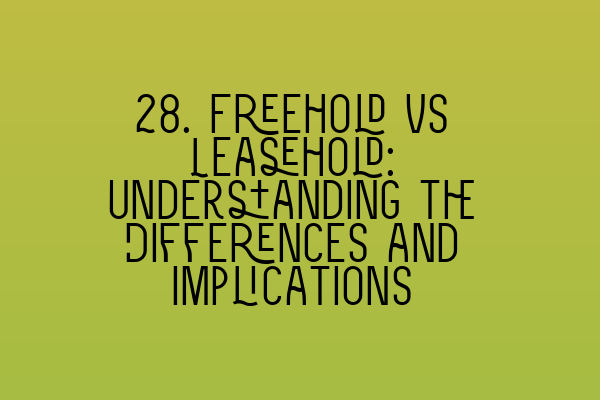Welcome to another informative blog post by SQE Property Law & Land Law. Today, we will be discussing an important topic in the world of property law – Freehold vs Leasehold: Understanding the Differences and Implications.
When it comes to purchasing a property or land, it is crucial to understand whether it is held as freehold or leasehold. The terms “freehold” and “leasehold” describe different types of ownership rights and have significant implications for property owners. Let’s dive into the details of each type and explore their differences.
Freehold Ownership:
Freehold ownership is the highest form of property ownership in England and Wales. When you own a property as a freeholder, you have complete and absolute ownership over the property and the land it sits on. You hold the property for an indefinite period and have the right to use, sell, alter, and pass it on through inheritance as you see fit.
As a freeholder, you are responsible for all maintenance and repairs, as well as any associated costs. You also have control over any changes or modifications to the property, subject to relevant local planning regulations. This level of control and ownership can be appealing to many property buyers, especially those looking to invest in real estate or establish a long-term home.
Leasehold Ownership:
On the other hand, leasehold ownership grants you the right to use and occupy a property for a specified period, which is outlined in a lease agreement. When you purchase a leasehold property, you essentially buy the rights to use the property for the duration of the lease, which can vary widely from a few years to several centuries.
While leasehold ownership provides you with the right to use the property, the actual ownership of the property and the land it is situated on remains with the freeholder or the landlord. As a leaseholder, you will typically pay an annual ground rent and may also have to contribute to service charges for the upkeep of common areas or shared facilities.
It is important to note that leasehold ownership comes with certain restrictions and obligations. These may include seeking permission for alterations or improvements to the property, abiding by certain rules and regulations imposed by the freeholder, and potentially facing potential restrictions on subletting the property.
Differences and Implications:
Now that we have a basic understanding of freehold and leasehold ownership, let’s delve into the differences and implications they have on property owners:
1. Control and Ownership: As a freeholder, you have absolute control and ownership over the property and the land, whereas leasehold ownership grants you a limited right to use the property for a fixed period.
2. Costs and Responsibilities: Freeholders are responsible for all maintenance and repair costs, while leaseholders may have to pay ground rent, service charges, and contribute towards major works and repairs.
3. Length of Ownership: Freehold ownership offers permanent and indefinite ownership, whereas leasehold ownership is for a specified period outlined in the lease agreement.
4. Buying and Selling: Freehold properties are generally more desirable and easier to sell, while leasehold properties may require additional considerations and potential restrictions.
5. Lease Extensions and Enfranchisement: Leaseholders have the right to extend their lease or, in certain circumstances, acquire the freehold through a process called enfranchisement, providing an opportunity to gain additional control and ownership rights.
Understanding the differences and implications between freehold and leasehold ownership is crucial when considering purchasing a property. It is advisable to consult a professional property solicitor who specializes in property law to ensure you fully comprehend the legal aspects and make an informed decision.
At SQE Property Law & Land Law, we offer expert legal advice and assistance in all aspects of property law. Our team of experienced solicitors can guide you through the complexities of freehold and leasehold ownership, providing you with the knowledge and support you need.
If you want to test your knowledge of property law, don’t forget to check out our SQE 1 Practice Exam Questions and SQE 1 Practice Mocks FLK1 FLK2 articles. We also provide SQE 1 and SQE 2 Preparation Courses to help aspiring solicitors excel in their exams. Stay updated with the latest SRA SQE Exam Dates to plan your study schedule effectively.
Remember, making an informed decision when it comes to property ownership is essential, and we are here to assist you every step of the way. Contact SQE Property Law & Land Law today for expert advice and guidance.
